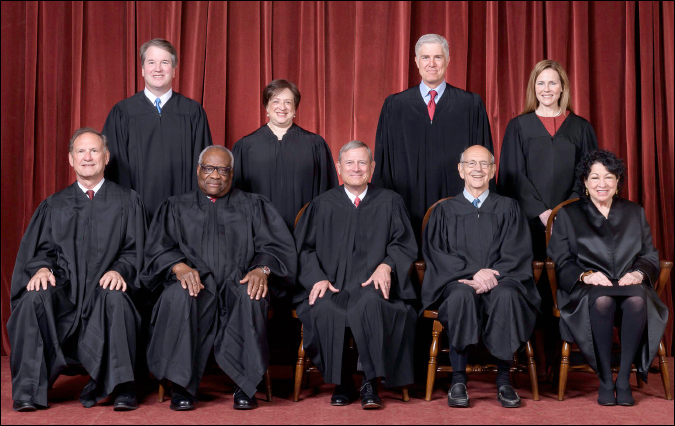By Jim Ellis
July 6, 2021 — On their last day of the year’s early session last week, a Thursday, the Supreme Court of the United States issued rulings on the Arizona voting rights case and the California non-profit organization disclosure lawsuit.
In the Democratic National Committee v. Brnovich, the Supreme Court with Justice Samuel Alito writing for the 6-3 majority, ruled that the state of Arizona did not infringe upon minority voting rights or violate Section 2 of the Voting Rights Act in both prohibiting ballot harvesting with certain exceptions, and not counting provisional ballots cast from voters who do not reside in the particular precinct that the polling place covers.
The high court agreed with Arizona Attorney General Mark Brnovich’s (R) arguments that the laws are not racially motivated, nor do they intentionally discriminate against certain segments of the voting population, thus overturning the full 9th Circuit Court of Appeals ruling.
Originally in 2016, Brnovich won at the district court level and on the first appeal to a three-judge panel from the 9th Circuit. The DNC requested an en banc review of the original appellate ruling that agreed with Brnovich, and the entire 9th Circuit membership overturned the decision, siding with the plaintiff. At that point, AG Brnovich petitioned the Supreme Court, which agreed to hear the case. (Hearing cases en banc allows the full circuit court to overturn a decision reached by a three–judge panel. Due to the decreasing probability of U.S. Supreme Court intervention, the circuit court is often the court of last resort in the ordinary life of a case, thereby amplifying the importance of en banc review.)
In his ruling, Justice Alito stated that “every voting rule imposes a burden of some sort,” and that “mere inconvenience cannot be enough to demonstrate a violation of Section 2.” He also cautioned that, “what are at bottom very small differences should not be artificially magnified.”
While agreeing that holding free and open elections is a “valid and important state interest,” he also addressed the voter fraud argument, clearly stating that attempting to prevent such abuses is also a “strong and entirely legitimate state interest.”
In her article discussing these rulings, Supreme Court expert Amy Howe, in her Howe on the Court article that was published on the SCOTUS blog, offered that the Brnovich ruling “will make it more difficult to contest election regulations under the Voting Rights Act,” and thus likely means fewer voting rights cases coming through the courts. She further categorized this decision as a “major ruling.”
In the second case, Americans for Prosperity Foundation v. Bonta, the organization sued the state of California, with new Attorney General Rob Bonta (D) arguing, saying that the state requiring donor disclosure for charities and non-profit organizations is a violation of the 1st Amendment because it deterred prospective donors from making contributions. The SCOTUS, with Chief Justice John Roberts writing for the 6-3 majority, agreed with the plaintiff.
The 9th Circuit had overturned the original district court ruling that agreed with the plaintiff, under the rationale that the financial disclosure relates to an “important state interest in policing charitable fraud.”
All of the courts, even including Justice Sonia Sotomayor in writing her portion of the dissent, agreed that the disclosure of donors can lead to harassment, and retorted that California keeps the information confidential. Justice Roberts argued that “the State’s assurances of confidentiality are not worth much,” underscoring that the donors involved in this particular case were subject to harassment such as “bomb threats, protests, stalking, and physical violence” after their financial disclosure was filed.
Howe, in her coverage of this ruling, also termed the opinion as a “major victory” for the non-profit organizations.
California Recall
As has been predicted in the past couple of weeks, California Democratic leaders have changed their timing strategy with regard to scheduling the recall election for Gov. Gavin Newsom (D). Originally, they apparently believed a longer cycle would be better aligned with the governor’s political interest, but now it appears they think he is in a more advantageous position with a quicker vote.
Coming rolling power blackouts, another predicted round of treacherous forest fires, and closing polling data looks to be influencing the change of heart.
The legislature concluded their administrative duties with regard to the recall in much faster time than allotted. They quickly sent the completed recall petition to Lt. Gov. Eleni Kounalakis (D) for scheduling. Because the governor is the subject of the recall, the election scheduling power transfers to the lieutenant governor.
Immediately upon receiving the petition, Kounalakis acted. She scheduled a tight candidate filing deadline of July 17, with the recall vote scheduled for Sept. 14.
Voters will decide two questions. First, whether to remove Gov. Newsom from office, and the second, a replacement to serve the balance of the term should the recall succeed. A large number of 83 Democrats, Republicans, and no party preference candidates have made public statements about becoming a candidate; therefore, we could expect a final number of 75 individuals or more adorning the recall replacement ballot. As the subject of the recall, Gov. Newsom cannot become a replacement candidate.
After more than 2.1 million signature recall petitions were officially delivered on March 17, the long process has now finally yielded the live campaign’s formal beginning.

